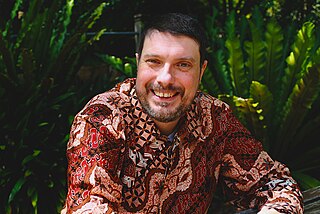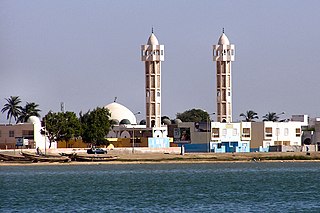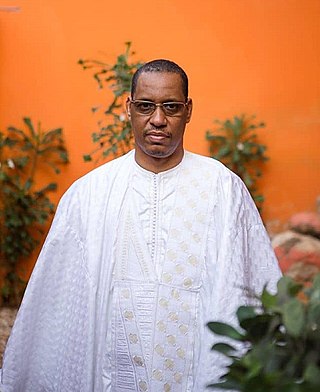Shia Islam in Senegal is practiced small number of Senegalese people, as well as by the Lebanese community in Senegal.
According to historian Alioune Badiane, Shia Islam has been present in Senegal for many centuries, and can be traced back to the Idrisid Dynasty. [1]
Unlike Shia Islam in Nigeria, in Senegal Shia Islam has generally coexisted peacefully with the dominant Sunni Islam branches and the Senegalese government. [2] [3]
Shia Islam is the primary religion of the Lebanese community in Senegal, which has been established in Senegal for over a century. It is also practiced by a growing number of native Senegalese, including the Wolof and Fula peoples. Since the 1970s, the number of native Shi'i Senegalese has steadily increased in both urban and rural areas. [4]
Lebanese have historically formed economically dominant communities in West Africa, including in Senegal. The Lebanese community in Senegal was established around the turn of the 20th century. Hence, many Lebanese in Senegal were born outside Lebanon, do not hold Lebanese citizenship, and have never been to Lebanon. [4]
Unlike Shia Islam in some other Islamic countries, Shia Islam in Senegal has not experienced significant conflicts with the state or with other branches of Islam. Rather, in Senegal, Shia Islam organizations and leaders have focused much more on social development, education, and charity. [4]
Mara A. Leichtman, an American anthropologist at Michigan State University, has spent over a decade carrying out fieldwork on Shia Islam and Sufism in Senegal, and has published various books and papers on her fieldwork. Leichtman distinguishes between the form of Shia Islam practiced by the Lebanese community in Senegal, as well as an "indigenous African Shi'ism" growing in popularity among local Senegalese. [5]
Leichtman has also conducted anthropological studies of major Shia organizations in Senegal such as the Mozdahir International Institute, headed by Senegalese Shi'i religious leader Cherif Mohamed Aly Aidara. According to Leichtman (2017), Mozdahir's various rural development projects help bridge the urban-rural divide among Shi'i Muslims in Senegal, and have helped to increase the number of Shi'i Muslims in Senegal. [6]

Senegal, officially the Republic of Senegal, is a country in West Africa, on the Atlantic Ocean coastline. Senegal is bordered by Mauritania to the north, Mali to the east, Guinea to the southeast and Guinea-Bissau to the southwest. Senegal nearly surrounds the Gambia, a country occupying a narrow sliver of land along the banks of the Gambia River, which separates Senegal's southern region of Casamance from the rest of the country. Senegal also shares a maritime border with Cape Verde. Senegal's economic and political capital is Dakar.
Sectarianism is a political or cultural conflict between two groups which are often related to the form of government which they live under. Prejudice, discrimination, or hatred can arise in these conflicts, depending on the political status quo and if one group holds more power within the government. Often, not all members of these groups are engaged in the conflict. But as tensions rise, political solutions require the participation of more people from either side within the country or polity where the conflict is happening. Common examples of these divisions are denominations of a religion, ethnic identity, class, or region for citizens of a state and factions of a political movement.

The Khojas are a mainly Nizari Isma'ili Shia community of people originating in Gujarat, India.

The Wolof people are a West African ethnic group found in northwestern Senegal, the Gambia, and southwestern coastal Mauritania. In Senegal, the Wolof are the largest ethnic group (~43.3%), while elsewhere they are a minority. They refer to themselves as Wolof and speak the Wolof language, in the West Atlantic branch of the Niger–Congo family of languages.

Islam is the predominant religion in Senegal. 97 percent of the country's population is estimated to be Muslim. Islam has had a presence in Senegal since the 11th century. Sufi brotherhoods expanded with French colonization, as people turned to religious authority rather than the colonial administration. The main Sufi orders are the Tijaniyyah, the Muridiyyah or Mourides, and to a lesser extent, the pan-Islamic Qadiriyyah and the smaller Layene order. Approximately 1% are Shiites and <1% are Ahmadiyya Muslims.
Islam is historically divided into two major sects, Sunni and Shia Islam, each with its own sub-sects. Large numbers of Shia Arab Muslims live in some Arab countries including Lebanon, Yemen, Bahrain, Iraq, Saudi Arabia, Kuwait, Oman, the UAE, and Qatar. Shia Muslims are a numerical majority in Iraq and Bahrain. Approximately 35% of the population in Yemen and half of the Muslims in Lebanon are Shia Muslims. There is also a very large population of Shia Muslims living in the Persian Gulf countries especially in Saudi Arabia. Approximately the whole population of East Saudi Arabia, the Eastern Province are Shia Muslims. Although Saudi government statistics claim that roughly only 20-40% of the Muslim population are Shia Muslims, the authenticity of this figure has been disputed. Recent reports and investigations indicate that there is, in fact, a much larger population of Shia Muslims present, with estimated figures of over 45% or even making up the majority of the Muslim population. Saudi Arabia officially follows Wahhabism, a strict, recently established sect of Sunni Islam. There is little freedom of religion between the different sects even whilst all of the population are Muslims. Smaller Shia groups are present in Egypt and Jordan. Despite the heavy presence of Shia Muslims in some Arab countries, particularly among the population of the Persian Gulf Arab countries, they have been treated poorly throughout history. Additionally, in recent times, Shia Muslims along with Kurds have faced genocide by the pan-Arabist regime of Saddam Hussein. For both historical and political reasons, Shi'a Arabs have fared relative poorly in much of the Arab world, and the topic of Shi‘ism and Shia groups is one of the most sensitive issues for the Sunni elite.

Abd al-Husayn Sharaf al-Din al-Musawi, also commonly spelled Abdel Hussein Charafeddine, Sharafeddine, or Sharafeddin, was a Shi'a Twelver Islamic scholar who has widely been considered a social reformer, "activist", and modern founder of the city of Tyre in Southern Lebanon.
The population of Shias in Africa is composed of several communities:
The Bainuk people are an ethnic group that today lives primarily in Senegal as well as in parts of Gambia and Guinea-Bissau.

Gabriele Marranci is a registered professional counsellor and psychotherapist specialised in Acceptance and commitment therapy or ACT and Somatic psychology. He is a member of the Australian Counselling Association (ACA), and the founder of Act Right Now Counselling Services.

There are various ethnic groups in Senegal, The Wolof according to CIA statistics are the majority ethnic group in Senegal. Many subgroups of those can be further distinguished, based on religion, location and language. According to one 2005 estimate, there are at least twenty distinguishable groups of largely varying size.
The French conquest of Senegal started in 1659 with the establishment of Saint-Louis, Senegal, followed by the French capture of the island of Gorée from the Dutch in 1677, but would only become a full-scale campaign in the 19th century.
There is a significant community of Lebanese people in Senegal.

Anti-Shi'ism is hatred of, prejudice against, discrimination against, persecution of, and violence against Shia Muslims because of their religious beliefs, traditions, and cultural heritage. The term was first used by Shia Rights Watch in 2011, but it has been used in informal research and written in scholarly articles for decades.

Religion and beliefs occupy an important place in the daily life of the nation of Senegal. Many denominations of the religion of Islam are represented. Christians represents 3.3%. Other belief's are officially practiced by 0.1% of the population, particularly Serer, but members of other religions also often partake in traditional practices.

The Sulaymanid dynasty was an Arab Muslim dynasty in present-day western Algeria, ruling from 814 to 922. The dynasty is named after the founder, Sulyaman I, who was the brother of Idris I, the founder of the Idrisid dynasty based in Fez. Both Sulayman and Idris, as great grandchildren of Hasan ibn Ali, were sharifs descended from Muhammad.
Mozdahir is an international non-governmental organization based in Dakar, Senegal.

Cherif Mohamed Aly Aidara is a Senegalese-Mauritanian Shia religious leader who is known for his work on international development in West Africa. He is one of the primary Shia religious figures in Senegal and West Africa.
Bonconto Commune is a rural community of Bonconto Arrondissement in the Vélingara Department, Kolda Region, Senegal. It is also spelled Bonkonto. The commune is known as a major center of Shia Islam in Senegal and is home to the Al Hassanayni Grand Mosque of Darou Hidjiratou, the largest mosque in the commune.
Sayed Jafar Sharafeddin – also transliterated from the Arabic language as Ja'far or Jaafar and Charafeddine, Sharafeddine, Sharaf al-Din or Sharf al-Din respectively – was a Baathist politician, who served as a deputy (member) of the Lebanese parliament.